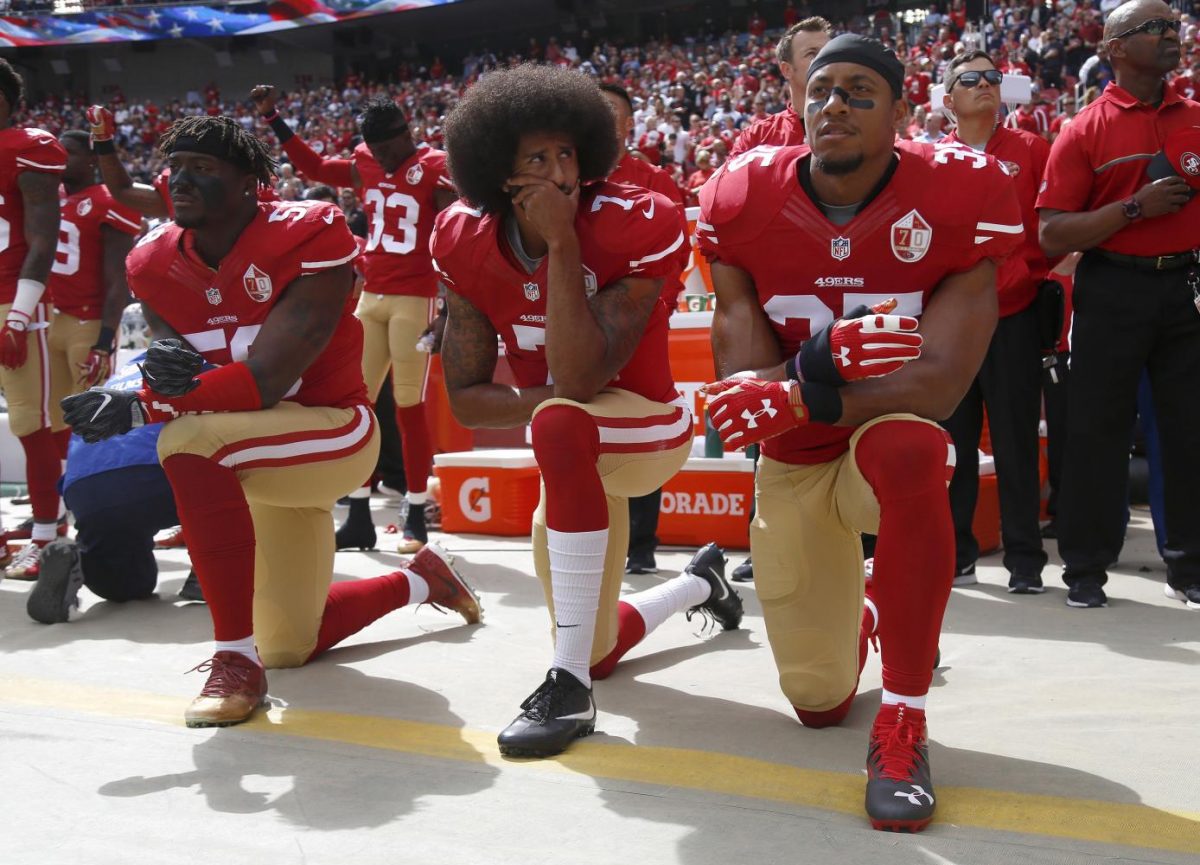#TakeAKnee is as American as it gets
From left, San Francisco 49ers’ Eli Harold (58), quarterback Colin Kaepernick (7) and Eric Reid (35) kneel during the national anthem before their NFL game against the Dallas Cowboys on Sunday, Oct. 2, 2016 in Santa Clara, Calif.
September 29, 2017
Ring, ring, ring! It’s your monthly reminder that America doesn’t care about black people. This month, it comes in the form of harsh backlash against NFL players reminding the general public of minority humanity and bringing awareness to the major racial disparities in America.
The #TakeAKnee movement, an act of nonviolent protest that involves an individual sitting or kneeling during the national anthem, has divided much of the country. Some backlash comes from those arguing the protests are anti-American and unpatriotic.
Refusing to stand during “The Star-Spangled Banner” is not a new method of protest. Some of these acts of revolution span all the way back to World War I, as many adolescents protested the enforcement of the national draft, according to the St. Louis Star, published in 1917. Even during World War II, this specific refusal to stand was deemed a form of political dissent.
It wasn’t until the infamous 1968 Summer Olympics in Mexico City when black athletes Tommie Smith and John Carlos’ black power salutes caught mainstream disdain and was deemed disrespectful against the nation’s sacred song.
Even today, Colin Kaepernick and others’ refusal to stand during the national anthem sparks controversy surrounding patriotism and disrespect toward the American armed forces.
Get The Daily Illini in your inbox!
America expects black people to remain silent and compliant to their abuse. That’s been made obvious. Many entertainers and athletes are praised for their skill and monetary success, but the moment they use their platform to address inequality, they are condemned.
Any acknowledgement of unproportional police brutality or a call to action for change is seen as an act of revolution. Any discussion of race is immediately disregarded because it makes white people uncomfortable. Concepts such as “the race card” were created so individuals could easily avoid acknowledging that there are major racial disparities that need to be addressed.
Bringing up the armed forces or questioning one’s patriotism is an intentional distraction to what the #TakeAKnee movement is about. Firstly, why should a group of people who were enslaved, abused and imprisoned for centuries applaud the country that committed these atrocities against them?
Secondly, the movement was never about disrespecting the military, but raising awareness of the dark history of America and the pathetic attempts to repair the damage that has been done.
Even though this nonviolent protest has nothing to do with soldiers’ contributions, both of my grandfathers fought through multiple wars. One of them, a black man living through 1960s America, returned to a country that continued to neglect and marginalize him, despite his sacrifice. Am I, among others, not entitled to exercise the very rights and freedoms my own lineage fought for?
Staying focused on every movement’s major objective and not letting any opposition misconstrue the true intentions is the most effective way of bringing awareness. Kaepernick’s and others’ fight for liberation has the ability to inspire others to stray away from just “sticking to sports.”
So no, kneeling as a form of protest against a corrupted system is not un-American. It is exactly the opposite because, much like other revolutions, fighting for a much needed change is what this country was founded on.
Isaiah is a sophomore in Media.







